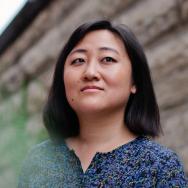UChicago faculty member Ling Ma’s first book “Severance” (2018) received multiple accolades and funding, including the Kirkus Prize, the Whiting Award and the New York Library Young Lions Fiction Award as well earning her a fellowship from the National Endowment for the Arts. Her second book, “Bliss Montage,” (2022) has won three significant awards in rapid succession: the National Book Critics Circle fiction prize, the Story Prize, and the Windham Campbell Prize for her collection of short stories.
“I am drawn to this form of writing and always wanted to write a book of short stories,” said Ling Ma, AB’05, assistant professor of Practice in the Arts in the Department of English Language and Literature and the College at UChicago. “A novel is a more forgiving format. In a short story, the reader sees the writer’s craft more easily.”
Her literary career began with writing short stories. In “Bliss Montage,” she revisits this format, using what she learned from drafting the novel “Severance” to enhance the eight stories, which reverberate with unusual echoes to one another.
“Ling Ma is the contemporary master of the uncanny,” said Deborah L. Nelson, the Helen B. and Frank L. Sulzberger Professor and chair in the Department of English Language and Literature and the College at UChicago. “Her blend of deadpan wit and surreal detail makes her instantly recognizable. But beyond her unique style, Ling has an insight into contemporary culture that has commanded attention. ‘Severance’ and the short stories of ‘Bliss Montage’ sneak up on the reader with their critique of capitalism or gender arrangements or friendship or immigration and globalization. Through the pleasure of her brilliant narrative gifts, Ling quietly tackles the big questions of our day.”
In “Bliss Montage,” the stories at the beginning are shorter and gradually become longer, more immersive and more intricate. Ma describes the first story, “Los Angeles,” as being quicker, flashier and an effort at pyrotechnics. She wrote it while working on “Severance.” Six of the eight stories were written from 2020 to 2021—the height of the pandemic—and when Ma had a year of leave from teaching at UChicago. The hypnotic story “G” about two longtime Asian American friends was written earlier.
“When I was writing the longer stories, I felt more confident about taking the reader’s time,” Ma said.
Not surprising to fiction writers, she doesn’t write one story at a time. Sometimes Ma may get stuck on writing one short story, work on a second or third story and then circle back to the first one. During this process, she realized that thought patterns emerged, resulting in echoes among many of these stories.
“I think what makes Ling's writing speak to so many readers, from teenagers on Twitter to contemporary literary theorists, is her amazing ability to construct allegorical life worlds from the absurdities of our contemporary social moment,” said Srikanth “Chicu” Reddy, professor in the Department of English Language and Literature and the College and Interim Director of the Creative Writing Program at UChicago. “Whether they are dating a yeti or printing Bibles in an apocalyptic pandemic, Ma’s protagonists live out the internal contradictions that we all inhabit. She's an Asian American writer, but she makes us see how Asian American experience might offer new metaphors for understanding what it means to be human, or maybe posthuman, today.”
Despite all the awards and avid readership for her first two books, Ma feels as though she is just beginning as a writer. She finds inspiration among other fiction writers such as Lucia Berlin, Miranda July, Franz Kafka and Nicole Krauss.
Her dreams also fuel her stories as well as her work and experiences. One story in “Bliss Montage,” “Office Hours,” is clearly based on UChicago and even has the professor’s office based in “Godspeed,” a sly reference to the Humanities Division building Goodspeed. Many of the other short stories focus on personal relationships existing outside the workplace.
“Ling's work has vivid magic in the marrow of the prose,” said Rachel DeWoskin, associate professor of Practice in the Arts in the Department of English Language and Literature and the College at UChicago. “It's original, funny, and utterly particular, whether she's writing about zombies, office drudgery, ex-boyfriends, Peking duck, mothers and daughters, or cities at night. The precision and verve of her work draw us in.”
Ma has other projects on the horizon, including writing a screenplay and another book of fiction.
“I’m trying to figure out my next moves,” Ma said. “I want to explore my writing more, but I’m in a lucky place.”
This story originally appeared on the Division of the Humanities website.
